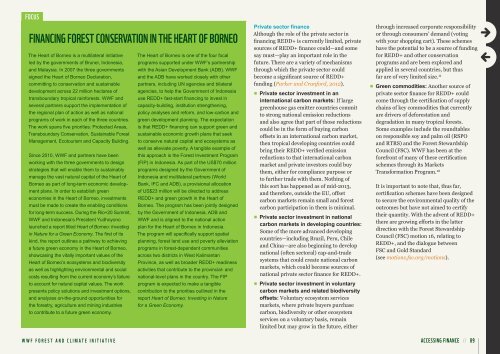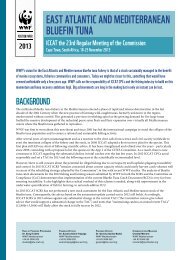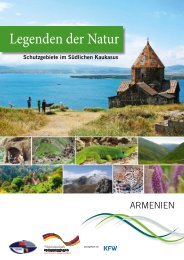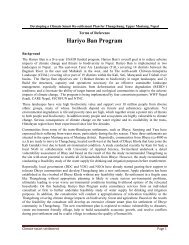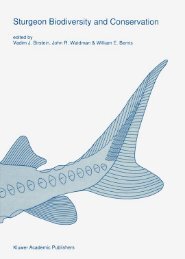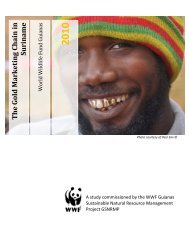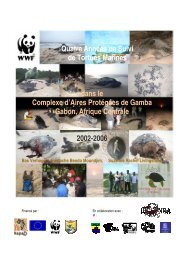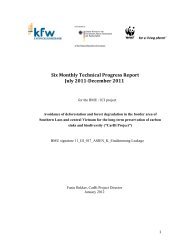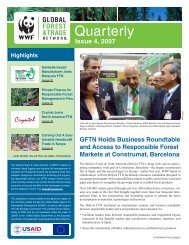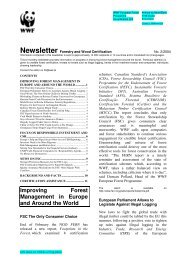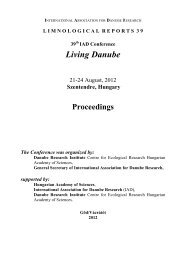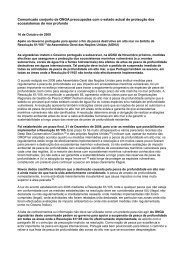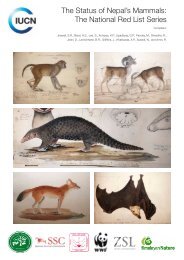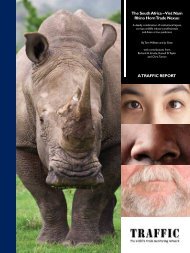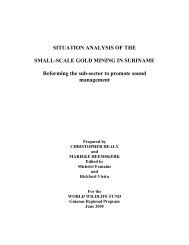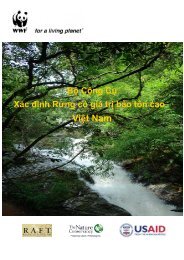WWF Guide to Building REDD+ Strategies
WWF Guide to Building REDD+ Strategies
WWF Guide to Building REDD+ Strategies
You also want an ePaper? Increase the reach of your titles
YUMPU automatically turns print PDFs into web optimized ePapers that Google loves.
FoCuS<br />
FinanCinG FoReSt ConSeRvation in tHe HeaRt oF BoRneo<br />
The Heart of Borneo is a multilateral initiative<br />
led by the governments of Brunei, Indonesia,<br />
and Malaysia. In 2007 the three governments<br />
signed the Heart of Borneo Declaration,<br />
committing <strong>to</strong> conservation and sustainable<br />
development across 22 million hectares of<br />
transboundary tropical rainforests. <strong>WWF</strong> and<br />
several partners support the implementation of<br />
the regional plan of action as well as national<br />
programs of work in each of the three countries.<br />
The work spans five priorities: Protected Areas,<br />
Transboundary Conservation, Sustainable Forest<br />
Management, Eco<strong>to</strong>urism and Capacity <strong>Building</strong>.<br />
Since 2010, <strong>WWF</strong> and partners have been<br />
working with the three governments <strong>to</strong> design<br />
strategies that will enable them <strong>to</strong> sustainably<br />
manage the vast natural capital of the Heart of<br />
Borneo as part of long-term economic development<br />
plans. In order <strong>to</strong> establish green<br />
economies in the Heart of Borneo, investments<br />
must be made <strong>to</strong> create the enabling conditions<br />
for long-term success. During the Rio+20 Summit,<br />
<strong>WWF</strong> and Indonesia’s President yudhoyono<br />
launched a report titled Heart of Borneo: Investing<br />
in Nature for a Green Economy. The first of its<br />
kind, the report outlines a pathway <strong>to</strong> achieving<br />
a future green economy in the Heart of Borneo,<br />
showcasing the vitally important values of the<br />
Heart of Borneo’s ecosystems and biodiversity<br />
as well as highlighting environmental and social<br />
costs resulting from the current economy’s failure<br />
<strong>to</strong> account for natural capital values. The work<br />
presents policy solutions and investment options,<br />
and analyzes on-the-ground opportunities for<br />
the forestry, agriculture and mining industries<br />
<strong>to</strong> contribute <strong>to</strong> a future green economy.<br />
<strong>WWF</strong> FOREST AND CLIMATE INITIATIVE<br />
The Heart of Borneo is one of the four focal<br />
programs supported under <strong>WWF</strong>’s partnership<br />
with the Asian Development Bank (ADB). <strong>WWF</strong><br />
and the ADB have worked closely with other<br />
partners, including UN agencies and bilateral<br />
agencies, <strong>to</strong> help the Government of Indonesia<br />
use <strong>REDD+</strong> fast-start financing <strong>to</strong> invest in<br />
capacity-building, institution strengthening,<br />
policy analyses and reform, and low-carbon and<br />
green development planning. The expectation<br />
is that <strong>REDD+</strong> financing can support green and<br />
sustainable economic growth plans that seek<br />
<strong>to</strong> conserve natural capital and ecosystems as<br />
well as alleviate poverty. A tangible example of<br />
this approach is the Forest Investment Program<br />
(FIP) in Indonesia. As part of the US$70 million<br />
programs designed by the Government of<br />
Indonesia and multilateral partners (World<br />
Bank, IFC and ADB), a provisional allocation<br />
of US$23 million will be directed <strong>to</strong> address<br />
<strong>REDD+</strong> and green growth in the Heart of<br />
Borneo. The program has been jointly designed<br />
by the Government of Indonesia, ADB and<br />
<strong>WWF</strong> and is aligned <strong>to</strong> the national action<br />
plan for the Heart of Borneo in Indonesia.<br />
The program will specifically support spatial<br />
planning, forest land use and poverty alleviation<br />
programs in forest-dependent communities<br />
across two districts in West Kalimantan<br />
Province, as well as broader <strong>REDD+</strong> readiness<br />
activities that contribute <strong>to</strong> the provincial- and<br />
national-level plans in the country. The FIP<br />
program is expected <strong>to</strong> make a tangible<br />
contribution <strong>to</strong> the priorities outlined in the<br />
report Heart of Borneo: Investing in Nature<br />
for a Green Economy.<br />
Private sec<strong>to</strong>r finance<br />
Although the role of the private sec<strong>to</strong>r in<br />
financing <strong>REDD+</strong> is currently limited, private<br />
sources of <strong>REDD+</strong> finance could—and some<br />
say must—play an important role in the<br />
future. There are a variety of mechanisms<br />
through which the private sec<strong>to</strong>r could<br />
become a significant source of <strong>REDD+</strong><br />
funding (Parker and Cranford, 2012).<br />
n Private sec<strong>to</strong>r investment in an<br />
international carbon markets: If large<br />
greenhouse gas emitter countries commit<br />
<strong>to</strong> strong national emission reductions<br />
and also agree that part of those reductions<br />
could be in the form of buying carbon<br />
offsets in an international carbon market,<br />
then tropical developing countries could<br />
bring their <strong>REDD+</strong> verified emission<br />
reductions <strong>to</strong> that international carbon<br />
market and private inves<strong>to</strong>rs could buy<br />
them, either for compliance purpose or<br />
<strong>to</strong> further trade with them. Nothing of<br />
this sort has happened as of mid-2013,<br />
and therefore, outside the EU, offset<br />
carbon markets remain small and forest<br />
carbon participation in them is minimal.<br />
n Private sec<strong>to</strong>r investment in national<br />
carbon markets in developing countries:<br />
Some of the more advanced developing<br />
countries—including Brazil, Peru, Chile<br />
and China—are also beginning <strong>to</strong> develop<br />
national (often sec<strong>to</strong>ral) cap-and-trade<br />
systems that could create national carbon<br />
markets, which could become sources of<br />
national private sec<strong>to</strong>r finance for <strong>REDD+</strong>.<br />
n Private sec<strong>to</strong>r investment in voluntary<br />
carbon markets and related biodiversity<br />
offsets: Voluntary ecosystem services<br />
markets, where private buyers purchase<br />
carbon, biodiversity or other ecosystem<br />
services on a voluntary basis, remain<br />
limited but may grow in the future, either<br />
through increased corporate responsibility<br />
or through consumers’ demand (voting<br />
with your shopping cart). These schemes<br />
have the potential <strong>to</strong> be a source of funding<br />
for <strong>REDD+</strong> and other conservation<br />
programs and are been explored and<br />
applied in several countries, but thus<br />
far are of very limited size. 11<br />
n Green commodities: Another source of<br />
private sec<strong>to</strong>r finance for <strong>REDD+</strong> could<br />
come through the certification of supply<br />
chains of key commodities that currently<br />
are drivers of deforestation and<br />
degradation in many tropical forests.<br />
Some examples include the roundtables<br />
on responsible soy and palm oil (RSPO<br />
and RTRS) and the Forest Stewardship<br />
Council (FSC). <strong>WWF</strong> has been at the<br />
forefront of many of these certification<br />
schemes through its Markets<br />
Transformation Program. 12<br />
It is important <strong>to</strong> note that, thus far,<br />
certification schemes have been designed<br />
<strong>to</strong> secure the environmental quality of the<br />
outcomes but have not aimed <strong>to</strong> certify<br />
their quantity. With the advent of <strong>REDD+</strong><br />
there are growing efforts in the latter<br />
direction with the Forest Stewardship<br />
Council (FSC) motion 16, relating <strong>to</strong><br />
<strong>REDD+</strong>, and the dialogue between<br />
FSC and Gold Standard<br />
(see motions.fsc.org/motions).<br />
aCCeSSinG FinanCe // 89


